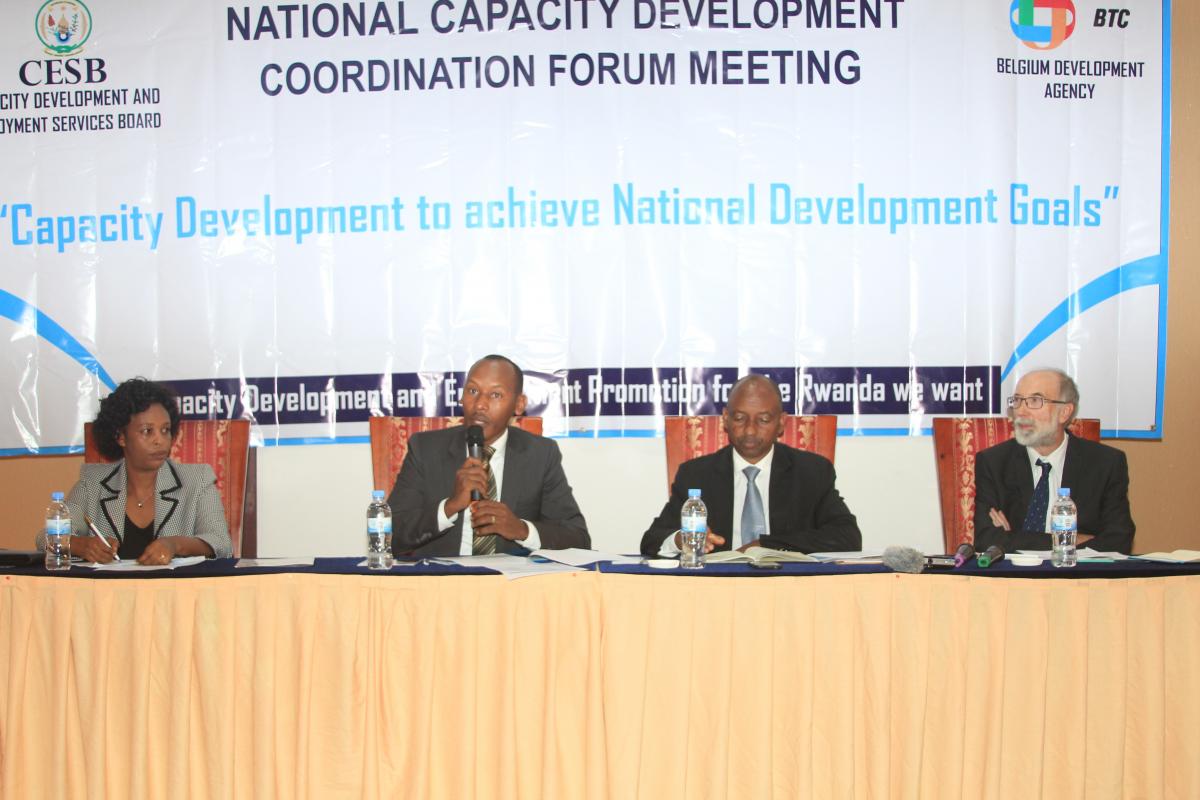Rwanda has joined few countries that have a National Capacity Development Policy
On the 10th of December 2016, the Government of Rwanda approved the National Capacity Development Policy, Strategy and Implementation Plan. By endorsing the National Development Policy, Rwanda became one of few African countries having an overarching policy framework to regulate Capacity Development across the country. In Africa, only Liberia, South Africa and Uganda currently have a similar Capacity Development framework.
With support from the Belgian Development Agency (BTC), the policy has been developed by the Capacity Development and Employment Service Board (CESB). Through the Strategic Approach to Capacity Building project (SACB), BTC provided technical and financial supports to facilitate policy analysis and writing sessions, including consultation with key stakeholders. The policy analysis and writing exercise resulted in a green paper of the policy which was taken up by the Ministry of Public Service and Labour (MIFOTRA) for the remaining stages for the cabinet approval.
A guiding and enabling framework
The National Capacity Development Policy is a guiding framework for all capacity development interventions in Rwanda. It will contribute to Rwanda’s ambitions to become a middle income country and service based economy.
This Policy will ensure that there is a skilled workforce to propel private sector led growth, capable and accountable organizations to provide public services to Rwandan citizens as well as an enabling environment for private sector and civil society organizations development.
The purpose of the Policy is to create an enabling framework for an inclusive national capacity development driven by sectors, integrated into sector and facilitated through a national coordination mechanism.
The Rwandan Capacity Development Policy contributes to a capable workforce and strong organisations for improved lives of Rwandans:
1. Institutionalised coordination mechanisms are in place to facilitate the oversight, implementation and reporting of capacity development programs and initiatives;
2. Capacity development is mainstreamed within sector and district planning, budgeting and reporting frameworks;
3. Capacity development is delivered through a network of capable, knowledgeable and quality assured service providers;
4. Sector and district actors have the capacity to diagnose, demand, manage and monitor capacity development programmes and initiatives;
5. Capacity development supported by Evidence-Based Learning and knowledge Exchange;
6. Engagement with the regional and international community to mobilise expertise and financial resources, advocate for capacity development and share good practices.
Mechanisms and Capacity Development guidelines
The policy proposes mechanisms for coordination, planning, budgeting and reporting, policy analysis and knowledge management of Capacity Development initiatives. It also addresses the need to strengthen the local capacity development industry, including knowledge on good capacity development practices. It sets guidelines to support capacity of public, private and civil society actors to identify their needs and take ownership of the capacity development process.
Key institutions for policy implementation
The policy identifies key institutions responsible for policy implementation. The capacity Development and Employment Services Board (CESB) and the Capacity Development Coordination Forum (CDCF) are given the coordination roles. Sectors, districts, Civil Society platform and the Private sector federation are seen as principal recipients of Capacity Development support. Development Partners and Ministries are identified as Capacity Development Responsibility Centers.
Capacity Development guided by sectors
The policy emphasises that sectors are the prime movers and focal points for capacity development. Support needs to be owned and guided by sector stakeholders and should be anchored in sector and district development plans.
At the same time, the national level plays a critical role in coordinating overall capacity development support. It sets norms and standards, provides technical guidance, promotes innovation and learning and provides a framework for monitoring and evaluation.
The policy does not prescribe specific interventions to address identified capacity challenges nor does it set specific capacity development targets. These are addressed in complementary national and sector policies, strategies and plans. Examples include the National Employment Program (NEP), the national policy on workplace learning and the public sector reform strategic framework, and the Capacity Development plans of all Ministries and Development Agencies in Rwanda.
Kick off in February 2017
To
kick off the implementation of the National Capacity Development Policy, CESB
convened a Capacity Development Coordination Forum to inform the stakeholders
on their roles as per the policy.
This
first meeting held on February 2, 2017 was due to explain some key policy
objectives and how the Public Sector, Private sector, Civil Society as well as
the development partners should contribute to the successful implementation of
the policy.
Latest news from this project
No news

